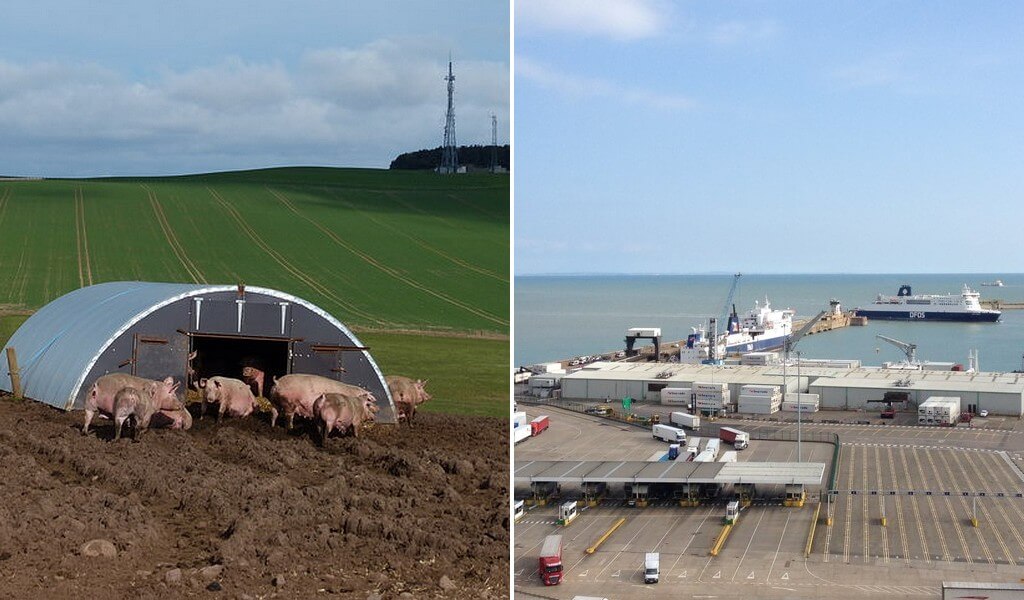The National Pig Association has said the current imbalance between the UK’s pork imports and exports poses a “serious threat” to the country’s pork industry.
The comments were made by National Pig Association (NPA) Chairman Richard Lister in a letter sent to the UK Environment Minister.
According to the Financial Times, the letter says that “higher costs, falling prices and a shrinking market” are creating a situation whereby most “pig processors expect to enter a loss-making situation in the first quarter of 2021”.
The NPA say the export/import imbalance is a result of the EU not introducing a grace period that allows trucks to flow through customs more easily. The UK has introduced such a grace period, which is making things easier for imports into Britain.
The letter adds that this issue, combined with Covid-19, presents a real danger to the industry:
“The overall picture is now one of enormous disruption to our export supply chain but of minimal problems and relative ease for EU imports into the UK. This imbalance, combined with other market pressures and Covid-19, is a serious threat to our industry.”
On top of that, the NPA claim that vets are struggling to deal with the huge volumes of paperwork required to complete the necessary health certificates.
One pig farmer even told the FT “If we don’t get this trade flow issue sorted out then we’ll lose these markets that have been around all my lifetime.”
Earlier this month, an NPA press release summarised some of the problems they had experienced since the end of the Brexit transition period:
- Officials at ports in the UK, France, Ireland and the Netherlands are taking a far more stringent approach to assessing paperwork, which in itself appears to be excessive. One load was caught at Calais for 20 hours undergoing vet checks and then rejected upon finally reaching its destination in Germany because of the delay.
- Additional paperwork is causing major delays for processors – one processor said it took nine hours to prepare the paperwork for one shipment to the EU last week.
- Another processor reported that when sending product to the Netherlands, each Export Health Certificate (EHC) needed 12 stamps for the English, Dutch and French versions required in duplicate. Therefore, for a 15 tonne load, the vet had to stamp paperwork 72 times. There is no electronic option at present – all EHCs have to be in hard copy
- Another processor reported that as we are now a third country, new rules require inspectors to check labels on each box in a consignment of pork products meaning that the whole pallet has to be offloaded and broken apart to check the boxes in the middle, adding more time to the process.
- The Eurotunnel needs to process 500 lorries an hour but only has the veterinary capacity for 150 an hour which will slow things down even more.
- The administrative burden of EHCs means that vets are struggling to meet the demand and the costs for exporters have increased.
The letter from the NPA comes just days after a haulier specialising in the transportation of meat products openly vented its frustration over the UK/EU border arrangements on Facebook.
It is not just pork processors that are having trouble exporting goods to the EU either.
Scotland Food & Drink boss James Withers has revealed that an exporter of Scottish Salmon has had to abandon her EU customers due to £100 per-order customs-related costs.
BREXIT COSTS
This, below, chimes with a food exporters meeting last night.
One example: £500-£700 new bureaucratic cost for a £2,000 order to EU
One exporter: “It’s now cheaper for us to send product to China than to send it 30 miles over the English Channel.” https://t.co/8gpKYVo9O9— James Withers (@scotfoodjames) January 27, 2021
Earlier this week, another Scottish business also highlighted its concerns about EU exports.
Alistair Wilson, co-founder of Isle of Skye Distillers, told their local newspaper that exporting their Misty Isle Gin has been a “nightmare” post-Brexit.
Wilson explained that even his haulier, who has 30 years of experience transporting goods internationally, didn’t know what was going on.
Photo credits: Mat Fascione (left) + Chris Whippet (right) – Geograph UK











